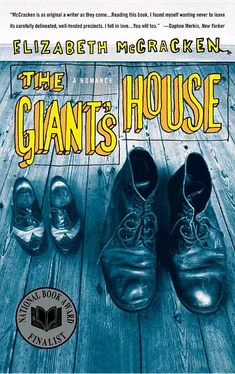I walked back to the library, to the staff room. I sat down. I didn’t have to wait for the test results: I knew. Astoria followed me. Normally we weren’t ever in that room together; when one of us was on the desk, the other was off. I was sitting on the awful sofa we’d inherited when the town manager’s office had been redecorated. I must have looked like I’d been hit by a truck and thrown onto that sofa, my legs off in different directions, my head flopping back.
“I think you should consider taking some time off,” Astoria said.
I didn’t speak; like an accident victim, I concentrated on not moving anything.
“You’ve been through all of this,” she said, sitting down next to me, “and you haven’t taken any off. You’re exhausted. Get away. We’ll figure it out here. I know you don’t think so, but we can keep this place running without you awhile — and that’s not an insult, it’s a compliment. You’ve got this library running so tightly it can go by itself.”
My eyes started to tear, because she was lying. I was doing a terrible job, and had been. “It’s okay,” I said. I sat up. “I’ll be taking time off soon enough.”
“You will?” she said.
“I will. I’m pregnant.”
I can’t say that her mouth fell open, but her entire face rearranged itself. Then she bit her lip.
“Wonderful?” she asked.
I nodded. I think I even blushed.
“Good,” she said. “But, Peggy—”
“James,” I said. “It’s James’s baby.”
I knew, by telling her, that it would get around town. One of the reasons Astoria liked working at the library was to receive and relay gossip. She would tell everybody — strangers, and the regular patrons, and Oscar and Caroline — and she would tell each in a hushed voice, as if they were the only ones she was taking into her confidence.
That night Caroline called me at home.
“Peggy,” she said.
“Yes?”
She waited for me to say something, but I didn’t.
“Is it true?” she began. I heard Alice nattering on in the background. “Is it true you’re expecting—”
“—yes—”
“James’s baby?”
“Yes,” I said.
“But that’s impossible, isn’t it?”
“No,” I said. “It’s more than possible. It’s true.”
“But that doctor. The one who wrote the article. He said James couldn’t …” She let her voice trail off, and I felt sorry for her. She was not good at this sort of thing.
“Did that doctor get anything else right?” I asked.
“No,” she said emphatically. “That’s what I told Oscar.” Suddenly her voice flooded with something, and it took me a second to realize it was her usual warmth, which she’d been holding back. “You should come home,” she said. “You could live in the cottage. We’ll close it down as a museum and set you up. You should live with us, Peggy. Look! I’m pregnant, too—”
“Caroline—”
“We’ll have children together,” she said, like a lovestruck man proposing marriage.
“Oh, Caroline,” I said. “Yes. Okay. Yes.”
And that night I packed a few things and put them in the car and drove back to Winthrop Street.
Oscar and Caroline and Alice greeted me, Oscar so full of attention and caution that I thought, if he wasn’t already married, he would have offered to make an honest woman of me. They carried my things back to the cottage.
“We’ll pick up your furniture tomorrow,” Caroline said. “You can’t climb up into this bed—”
“I’ve climbed into it before,” I said, not thinking how that sounded.
“Well, yes,” said Caroline. “I just meant — later, it will get harder. Believe me — after a while that bed will look like Mount Kilimanjaro. We’ll spruce up the place—”
“No,” I said. “Leave it. Leave everything.”
The town manager called me later that week, to tell me I’d been fired; not bad enough that the library (so he’d heard) was falling to pieces, but surely I understood the moral problem here. A public librarian, after all …
Fine, I told him, fine, and I said good-bye to my library. Oh, I was a scandal. A grown woman, they said, well into her thirties and him barely out of his teens. Not to mention everything else. Maybe they did mention it, some of them, but that talk didn’t make it back to me. Some of the more sympathetic and liberal people in town — those who considered themselves artistic — thought I was a romantic figure. Caroline told me a few people even claimed that James and I had gotten married secretly in New York. She’d done nothing to discourage that rumor.
I had a new job, anyhow, in charge of the James Carlson Sweatt Home. Still a librarian — always a librarian — I organized his letters, to and from, I wrote a guide to the newspaper clippings.
You would have thought that first week would have been the worst, but it wasn’t. I ate cookies from the bakery, canned soup heated up on the hot plate. I listened to the radio and read the last library books I’d brought to James, which since his death had sat on the night table, collecting fines; I’d known they were there, of course, just never could bear to pick them up. City of God, From Here to Eternity, Thurber Carnival . I’d felt like returning them meant I was closing out his account.
Finally one morning Caroline came to the cottage and said, “You can’t go on like this.”
I looked around the room. I thought she was kicking me out.
“There’s someone else you have to think about, Peggy,” she said, and she touched my stomach to remind me. “Come to the front house.”
“I like it here,” I told her.
“For meals. That’s all. For meals and a little company. I’m home all day, too; I could use the conversation myself.”
So I did that. I took my dinner and breakfast there, chatted with them. I wanted to stay at the cottage mornings and afternoons, waiting for visitors; I wanted to be always ready and present. That is, I wanted them to know that I lived there.
But evenings, I sat on the sofa with Caroline, whose stomach was just beginning to push at her own clothes; soon she’d move on to wearing Oscar’s pants, kept up with a knotted scarf. And though I’d thought during the week I’d spent alone in the cottage that it was the way I wanted it — me, the radio, the silly cat leaping from surface to surface — I discovered that it was simply because I could not have imagined the pleasant life in the front house. Oscar offering me something, sweet potatoes or gravy, a homey rich dish, his hands on one side of a warm platter or bowl and mine on the other; Caroline back and forth from the kitchen, her hair tied back; Alice, a good eater always, picking one thing off the plate and sticking it in her mouth till the plate came clean. Caroline cooked and I washed, each according to her abilities.
I’d always thought of happiness as some dramatic talent, or unreal luck; I’d never imagined it could come in this workaday variety. This was something James had done, too, after all: he sat in this dining room, ate Caroline’s careful soft food. She was frightened of people choking, and if anyone so much as coughed at her table, she looked alarmed; if it went on, she stood up asking, Are you okay, do you need some water? The cougher, red-faced and damp-eyed, had to smile and nod, and Caroline took her place again. Such sweet strange concern was everywhere in that house. It was not my life — I knew that — but it was the life of people I felt comfortable with, and that was enough. When dinner was over, I went back to the cottage and turned on the radio and knit. Caroline had taught me.
After a while I just stayed at the front house till it was time to go to sleep. Caroline and I got bigger and bigger. She was a little disappointed with me — she wanted someone to discuss stretch marks with, to compare swollen feet, and I demurred. But I learned from her, sometimes too literally, as if she were a girl I admired one class ahead. I did everything she did, two months behind: a crying jag at the end of the third month; a passion for salt in the fourth; a two-day superstitious prohibition on mentioning the baby at all in the fifth. When Caroline gave birth to another daughter, they named her Margaret Ann, after me and then Oscar’s mother. They didn’t realize that Peggy is my given name. Now they call her Ann, because I do.
Читать дальше












